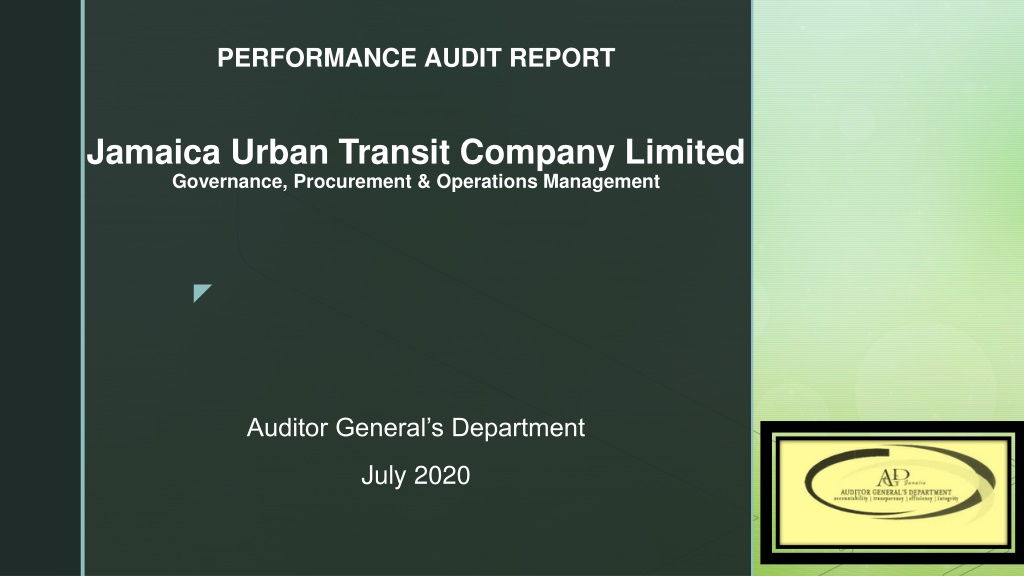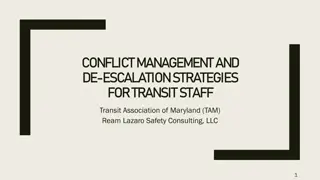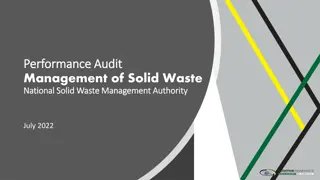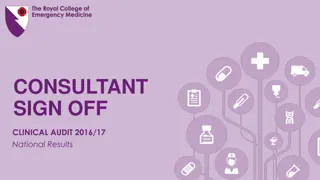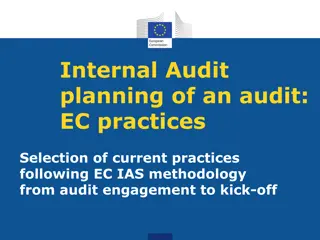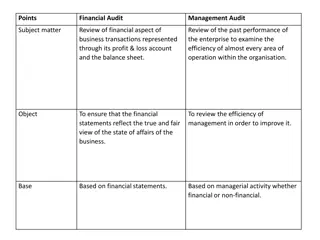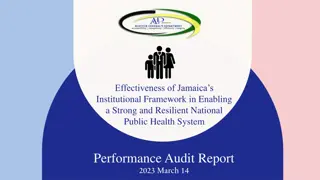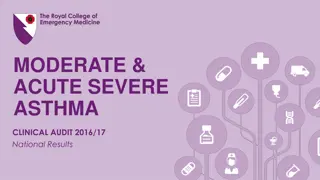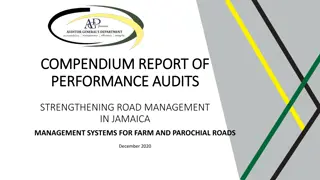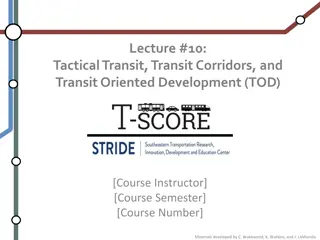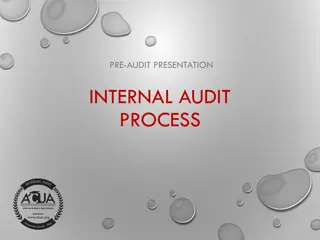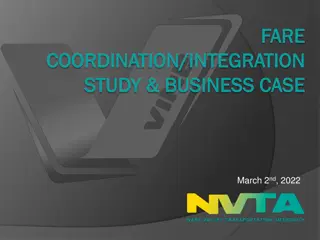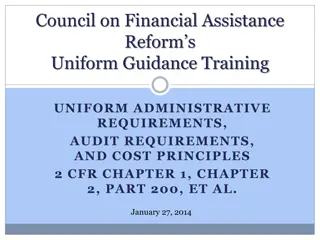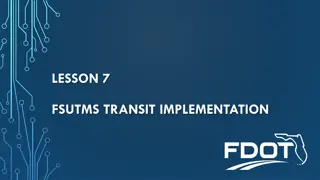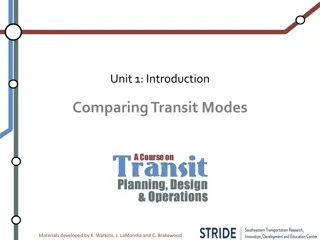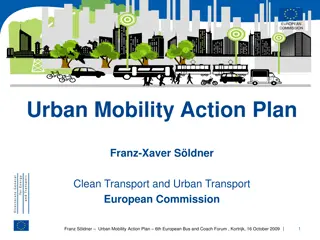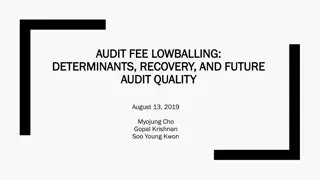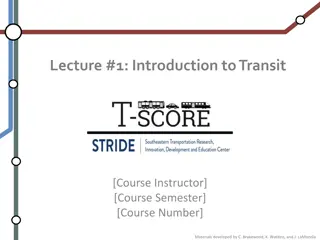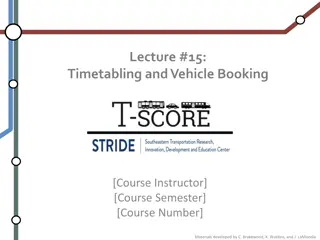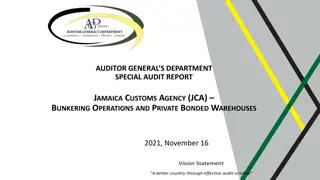Performance Audit Report on Jamaica Urban Transit Company Ltd.
Weak internal controls at Jamaica Urban Transit Company (JUTC) led to poor decision-making, costly breaches in Human Resource & Administration, and deficiencies in governance oversight. Issues included unapproved staff capacity, exceeded budgets, ineffective recruitment strategies, and operational management shortcomings. JUTC's Board and Portfolio Ministry were found lacking in implementing necessary controls, adhering to governance frameworks, and protecting the company's interests. The report highlighted the need for improved practices to enhance service delivery, operational efficiency, and financial viability at the JUTC.
Download Presentation

Please find below an Image/Link to download the presentation.
The content on the website is provided AS IS for your information and personal use only. It may not be sold, licensed, or shared on other websites without obtaining consent from the author. Download presentation by click this link. If you encounter any issues during the download, it is possible that the publisher has removed the file from their server.
E N D
Presentation Transcript
PERFORMANCE AUDIT REPORT Jamaica Urban Transit Company Limited Governance, Procurement & Operations Management Auditor General s Department July 2020
Overview of JUTC Ownership Routes Mandate The JUTC is a wholly owned government- subsidized public entity that was established in July 1998. JUTC holds an exclusive license to provide public passenger transportation service in the Kingston Metropolitan Transport Region (KMTR). JUTC s mandate is to provide a safe, reliable, modern, professional, efficient, & cost- effective transportation service to the KMTR.
What We Found Weak Internal Controls led to poor decision-making and costly Human Resource & Administration (HRA) breaches
The Portfolio Ministry was deficient in its oversight of the JUTC to ensure adherence to the PBMA Act and GOJ Corporate Governance Framework (CGF) The Ministry did not conduct annual performance reviews of JUTC s Board as required by the CGF JUTC s Board was partially compliant with the CGF The Portfolio Ministry did not ensure that JUTC s Board adhered to the Risk Management Framework to protect the company s interest JUTC s Board failed to implement recommendations of the Internal Audit Committee
JUTCs Board of Directors failed to implement the necessary internal controls to protect the financial resources of the Company JUTC had an unapproved staff capacity costing an accumulated $1.15 billion that was not leveraged for operational efficiency JUTC s management exceeded the overtime budget by $728.6M despite excess staff capacity JUTC breached its HRA Policy & Procurement guidelines as it failed to advertise vacant positions & engaged staff in unapproved positions or without the minimum qualifications JUTC s recruitment & retention strategy for maintenance staff was ineffective to enable quality service delivery.
Deficiencies in Operations Management adversely impacted service delivery JUTC s fleet management software - Automated Vehicle Locator (AVL) system acquired in 2017 was yet to be implemented, denying achievement of value for money. The average number of buses available between FY2014/15 & FY2018/19 was consistently lower than target, with a declining trend from FY2016/17 JUTC s management did not actively monitor sub- franchise operators to assess whether the arrangement benefitted the Company JUTC s management was ineffective in implementing strategies to improve the Company s operational efficiency and financial viability
Deficiencies in Maintenance Management adversely impacted service delivery JUTC s maintenance programme was ineffective as demonstrated by a high incidence of malfunctioning buses, which adversely impacted service delivery JUTC did not take full advantage of the capacity-building component of various contracts signed with overseas suppliers JUTC s management outsourced maintenance and repairs services, costing approximately $419 million despite excess mechanics on staff and available funding for training
Deficiencies observed in JUTCs Procurement practices Frequent use of direct contracting procurement methodology for high value transactions, particularly fuel, did not meet the important principles of transparency, competition, and fairness. JUTC s procurement planning was not always transparent due to incomplete information on some planning documents Lack of adequate due diligence by JUTC in its procurement of buses resulted in the non-receipt of full value for money
Poor monitoring & management of inventory undermined accountability & heightened the risk of stock outs, obsolescence and financial losses JUTC did not fully utilise Sage Accpac software to proactively track inventory levels and generate orders to prevent stock out of critical items. Hence JUTC could not be assured of full receipt of value for money JUTC s inventory management system did not log 47 purchase orders totalling $422.6 million that were received by the Central Stores
JUTC unable to reconcile fuel inventory Fuel purchases represented JUTC s single largest expenditure, valuing $2.5B for FY2018/19 up from $1.5B in FY2014/15 JUTC s management of fuel inventory was manual and largely paper-based, although JUTC had in place an electronic system, known as Petro Vend, which was intended to automatically record and monitor the fuel inventory JUTC s fuel records for FY2014/15 to FY2018/19 identified significant variations in fuel inventory levels across all depot locations. We noted a net accumulated shortage of 231,222.3 litres of fuel, valued at approximately $36.5M
Auditor Generals Recommendations Route Management JUTC should urgently conduct a cost-benefit analysis to determine the feasibility of its bus routes. This is not only necessary to inform any decision regarding the pursuit of its Route Rationalisation Programme but is critical to the financial viability of the company. JUTC should also conduct a cost-benefit analysis to determine whether an expansion in the sub-franchise operations would be beneficial to the financial sustainability of the Company; in addition, a structured monitoring mechanism should be implemented for sub-franchise operators to increase the level of accountability.
Auditor Generals Recommendations Governance Practices The Portfolio Ministry should consider developing a competency profile for the JUTC Board in accordance with the GOJ Corporate Governance Framework. Having the appropriate skillsets on the Board is essential to effective strategic oversight and efficiency of the Company, consistent with its mandate and public sector accountability. The Board should implement internal controls to ensure adherence to Government Policy guidelines and regulations, as well as the adoption of proper HRA practices. In addition, consideration should be given for the inclusion on the Board, of experts in logistics and financial analysis to enhance service delivery and financial risk management
Auditor Generals Recommendations Procurement & Inventory Management JUTC must take immediate steps to improve inventory management systems and consider full implementation of Sage Accpac. This will enable JUTC to take full advantage of its logging and tracking features to reduce risk of stock outs, obsolescence and pilferage that can lead to financial losses; as well as to achieve value for money from funds spent to acquire the system. JUTC should seek to improve its procurement practices to ensure adherence to Government Procurement laws and guidelines, including the use of competitive bidding to achieve best price for its major purchases, in particular the acquisition of fuel.
